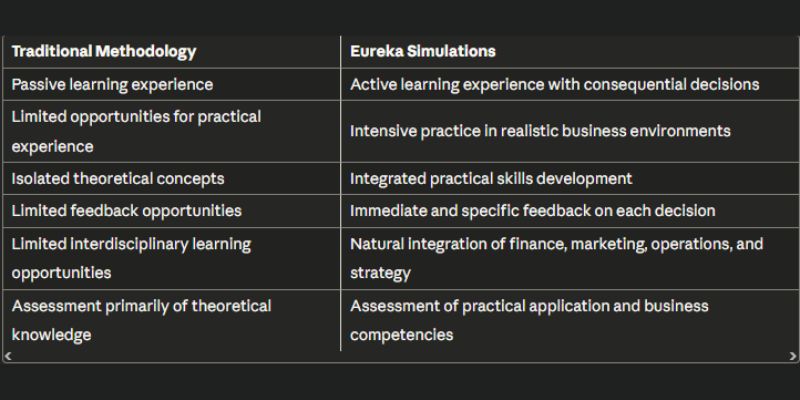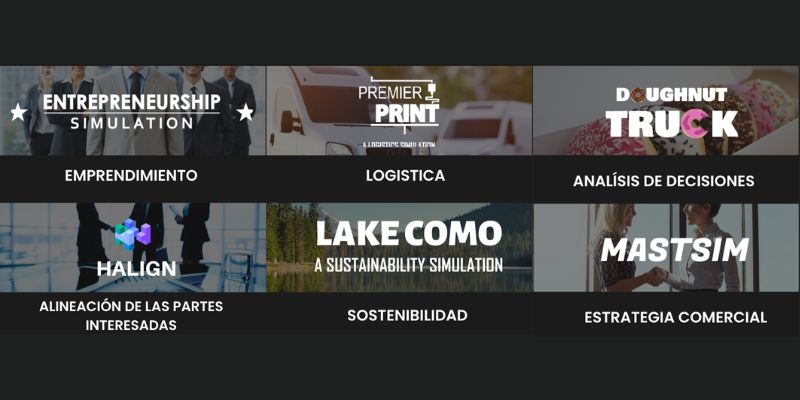Implementing business simulations in the MBA classroom for the first time represents a transformative moment for both professors and students. This innovative pedagogical methodology is revolutionizing business education by closing the gap between traditional academic theory and real business practice.
At Eureka Simulations, we have accompanied hundreds of professors on this journey of pedagogical transformation, and we know firsthand the profound impact this experience generates for both educators and students.
The Moment of First Implementation: A Unique Experience
When a professor introduces business simulations in their MBA classroom for the first time, the experience is described as a natural mix of excitement and uncertainty. Educators must prepare for the unknown, as simulations, by design, are unpredictable and replicate the complexities of the real business world where outcomes depend on participants' decisions.
The immediate impact on students is remarkable. As one MBA student describes: "The business simulation experience has been my ultimate and most enriching learning experience. It was a dynamic combination of complexities, all possible business skills, and the pressure of taking responsibility for making effective decisions."
At Eureka Simulations, this initial moment becomes more than just technology adoption: it's the beginning of a transformation in how students experience business learning. Our pedagogical support approach ensures that professors are not alone in this process, providing continuous support from initial training to learning outcomes analysis.
Fundamental Changes in the Educational Paradigm
Transformation of the Teaching Role
Implementing simulations marks a radical transformation in the educator's role. Professors must shift from their traditional instructor role to business mentor and coach. Instead of simply transmitting knowledge, they become guides who help students see the big picture without directly indicating the correct decisions.
Eureka Simulations facilitates this transition through pedagogical resources specifically designed to support the professor in their new role: facilitation guides, evaluation rubrics, and structured debriefing sessions that maximize reflective learning.
New Classroom Dynamics
Students experience a completely different level of engagement. As one professor notes: "Students tend to engage easily with simulation games in a relaxed and fun way, despite the competition the game introduces." The competitive element brings a high degree of focus to students who might otherwise just be going through the motions.
What distinguishes Eureka Simulations is our capacity to generate sustained engagement beyond initial motivation. Our simulators are designed with immediate feedback cycles that allow students to see the impact of their decisions in real time, keeping the learning curve in its optimal challenge zone.
Areas and Learning Outcomes That Can Be Assessed
Comprehensive Business Competencies
Business simulations allow for assessing a wide range of competencies that would be difficult to measure with traditional methods:
Leadership and Management Skills:
- Decision-making under pressure
- Team leadership and coordination
- Scarce resource management
- Strategic and financial planning
Analytical Competencies:
- SWOT analysis
- Market and competitive analysis
- Financial data interpretation
- Systems thinking
21st Century Skills:
- Collaboration and teamwork
- Effective communication
- Creative problem-solving
- Critical thinking
This allows professors to go beyond traditional assessment and understand not only what each team decided, but how they arrived at those decisions and what competencies they demonstrated in the process.
Innovative Assessment Methodologies
Simulations offer unique assessment opportunities that go beyond traditional exams:
- Process Assessment: Educators can evaluate how students arrive at an answer, not just the final outcome. Decisions made during the game reflect students' level of understanding.
- Comprehensive Assessment: Both theoretical knowledge and its practical application can be measured. Students show their thinking process through the decisions they make in the game.
- Soft Skills Assessment: Simulations allow for evaluating competencies like leadership, teamwork, and communication, which are crucial in the business environment but difficult to measure with traditional methods.
With Eureka Simulations, professors receive intuitive dashboards that show each team's performance across multiple dimensions: profitability, market share, operational efficiency and financial management. These data enable precise pedagogical interventions and feedback conversations grounded in objective evidence.
Improvements Over Traditional Educational Experience
Superior Knowledge Retention
Research consistently demonstrates that simulations significantly outperform traditional methods in terms of learning retention and engagement. Business simulations are very effective in facilitating strategic management learning, with evidence favoring business simulation over other pedagogical tools with respect to retention of what is learned (Brown, 2009; experiential learning methods study).
Active learners using hands-on activities, gamification, and group discussion retained 93.5% of previously learned information compared to only 79% for passive learners after one month (Bridge, 2025). This substantial difference highlights why experiential learning through simulations creates more lasting impact than traditional lecture-based instruction.
Spaced learning and experiential learning have been identified as being more efficient for long-term knowledge retention than other forms of learning (Leveraging experiential learning training through spaced learning, 2018), making business simulations particularly effective when integrated into MBA curricula with appropriate reflection and practice intervals.
In our implementations across leading business schools, we have observed that students who participate in Eureka simulations consistently report significantly higher confidence levels in their ability to apply business concepts in real contexts, demonstrating the practical transfer of learning that employers value most.

Connection to the Real World
Simulations replicate real economic conditions and customer behavior. Students can naturally apply everything they have learned in class while competing, creating a unique market where they challenge each other with smart and surprising decisions.
Emotional and Motivational Impact
Elevated Emotional Engagement
Implementing simulations generates a significant emotional impact on students. As one researcher describes: "Simulations engage students not only intellectually, but emotionally and behaviorally." This emotional engagement is crucial for deep and lasting learning.
The Eureka experience goes beyond superficial engagement: our simulators are designed with authentic business narratives that generate emotional ownership. Students don't just make abstract decisions; they assume specific business roles with goals, stakeholders, and tangible consequences that activate deep experiential learning.
Confidence Building
Students develop greater confidence in their business skills through practice in a safe environment. As one study notes: "Simulations help participants develop confidence due to practice in decision-making, risk-taking, and operations management."
Our "safe-to-fail environment" approach allows students to experience the real impact of suboptimal decisions without real professional consequences, accelerating their learning curve in ways that would be impossible in traditional business internships.
Intrinsic Motivation
The competitive element and active participation generate intrinsic motivation. Students assume the simulation role as if it were reality, living in a microcosm that helps them see the interconnection of business decisions.
At Eureka Simulations, gamification is meaningfully integrated: real-time rankings, achievement milestones, and performance visualizations that keep motivation high without sacrificing academic rigor. Students compete, but also learn from other teams' strategies through our comparative analysis functionalities.
Preparation for the Professional World
Employability Development
Simulations specifically develop the skills that employers seek in MBA graduates. Recruiters recognize that programs incorporating experiential learning prepare employees very well, not only academically, but also in terms of practical and soft skills.
Eureka Simulations works closely with business schools to ensure that our simulators develop the competencies most demanded by the job market. The practical experience students gain in our simulations translates directly into greater preparation for case interviews and real challenges.
Improved Job Placement Rates
Programs that incorporate experiential learning show superior results: 76% of students find employment within 3 months after graduation, and 89% work in an international environment.
Institutions that implement Eureka simulations report measurable improvements in employability indicators, including faster placement rates, higher starting salaries, and greater employer satisfaction with graduates' practical skills. Students can articulate concrete business decision-making experiences during selection processes.
Practical Implementation and Recommendations
Strategies for First Use
For professors implementing simulations for the first time, at Eureka Simulations we recommend:
Before Implementation:
- Complete Training: Participate in our pedagogical onboarding sessions where we explore not only the simulator mechanics, but effective facilitation strategies
- Pilot Simulation: Experience the simulator personally or with colleagues to anticipate challenges and learning opportunities
- Learning Objectives Design: Work with our pedagogical team to align the simulation with specific course learning outcomes
During Implementation:
- Leverage Live Support: Our team offers real-time support during the first sessions
- Use Pedagogical Resources: Debriefing guides, provocative questions, and evaluation rubrics designed by experts
- Monitor Analytics: Use our facilitator dashboard to identify teams that need intervention
After Implementation:
- Structured Reflection Session: Facilitate a deep debriefing that connects the experience with theory and professional practice
- Results Analysis: Review performance reports to identify learning patterns and areas for improvement
- Continuous Improvement: Participate in our community of practice of educators who share experiences and best practices
Learning Maximization Methodologies
The most effective methods we have identified in our experience with leading institutions include:
- Becoming a Business Coach: Adopt a Socratic facilitation role where strategic questions guide learning without providing direct answers (Kolb's Experiential Learning Model, 1984)
- Incorporate Periodic Executive Reports: Use strategic report templates where teams justify their decisions and project future scenarios
- Assess Critical Thinking in Synchronous Sessions: Leverage pause moments between rounds for strategic discussions that reveal the reasoning behind decisions (debriefing sessions improve the potential of business simulation games, as noted in experiential learning research)
- Integrate Business Plans as Key Assignments: Connect the simulation with traditional academic deliverables that demonstrate deep understanding
- Conclude with Investor Presentations: Culminate the experience with pitch sessions where teams defend their strategy and results before "investors" (visiting professors or industry professionals)
- Combine Multiple Assessment Sources: Integrate simulation performance, written reports, and debriefing participation for a holistic assessment that captures both analytical and communication skills. The specific weighting (e.g., 40%-30%-30%) can be adjusted based on course learning objectives and institutional requirements.
The Eureka Impact: Beyond Simulation
At Eureka Simulations, we understand that a business simulation is much more than educational software. It's a complete experiential learning ecosystem that includes:
- Cutting-Edge Technology: Simulators based on validated economic models and rigorous instructional design that replicate real business dynamics
- Pedagogical Support: Continuous support from course design to learning impact analysis, ensuring that each implementation maximizes educational outcomes
- Learning Analytics: Dashboards and reports that transform simulation data into actionable insights for professors and students
- Community of Practice: Network of innovative educators who share experiences and co-create best practices in experiential learning
- Continuous Innovation: Constant development of new simulations and functionalities, including conversational AI integration for more sophisticated negotiations and assessments

Conclusion: Transforming the Future of MBA Education
Implementing business simulations in the MBA classroom represents a natural evolution toward more effective and relevant learning. This methodology not only improves knowledge retention and practical skills development, but also better prepares students for the challenges of the modern business world.
With Eureka Simulations, this pedagogical transformation is not a leap into the void, but rather a structured and supported process that converts professors into facilitators of transformative learning experiences, and students into confident and competent professionals ready to lead in the business world.
The question is no longer whether to implement simulations in the MBA, but when and how to do so in ways that maximize impact on student learning and employability. At Eureka Simulations, we are ready to accompany you on that transformative journey.



